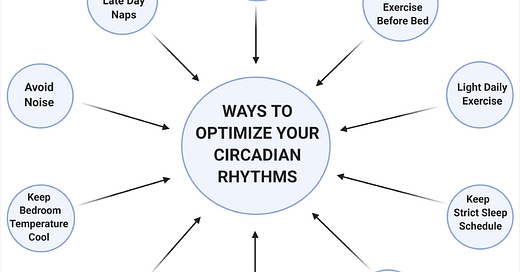Friday Hope: Maintaining a Healthy Sleep Schedule May Attenuate COVID-19 Severity: More Evidence for Melatonin
A curious Letter to the Editor from 2020 referenced a preliminary study showing circadian dysthymia as a risk.
Ways to optimize your circadian rhythms. Light is one of the most important regulators of the circadian rhythms. Chronic exposure to light, particularly to shorter wavelengths (like blue and green), at nighttime inhibits sleep-inducing neurons and decrease melatonin secretion. Naps later during the day usually comprise deep sleep (slow-wave), when there is a natural decline of our energy, and this interferes with nighttime sleep. Hot and humid temperatures increase wakefulness, reduced REM and slow-wave sleep. However, cooler temperatures between 13 to 23°C do not interfere with any of the sleep stages. Noisy environments can also interfere with deep sleep thus a quiet environment is preferred. Food intake at an inappropriate time of the day disrupts the coordinate function of circadian rhythms between the central and the peripheral organs resulting in metabolic imbalances. Alcohol, caffeine, or nicotine should be avoided at least 4 h before bedtime as it is associated with a fragmented sleep pattern. Relaxation exercises before bedtime can help lower heart rate, blood pressure, and reduce sympathetic nervous system activation, which facilitates sleep. Stimulating activities or exercise leads to alteration of the circadian functioning by changing the expression of clock genes and creates shifts in the timing of melatonin rhythms in humans. Melatonin supplements can also help fall asleep, especially during insomnia or jet lag. Adhering to a strict sleep schedule is also important that can help strengthen the circadian rhythms.
I was thinking (sleeping?) deeply this week - given how effective simple therapeutics like Vitamins K and D are for COVID/Spike Protein Pathologies, what other simple, effective therapeutics are we missing? Then it occurred to me. After speaking with those I know, including referencing myself, who have either never had COVID or had an extremely mild case, I discovered we have one thing in common: All of us make certain to get at least seven hours of quality sleep every night. So, I decided to research this observation.
I found a very curious Letter to the Editor from the beginning of the Pandemic.
Shift work is also a potential risk for many health care providers and supply chain workers. Increased demand for services and increased potential for absences may leave those remaining in the workforce at greater risk for developing a circadian rhythm sleep-wake disorder. This may not always be preventable, but efforts should be made to increase awareness and take steps to ensure services are available to those in need. A preliminary study of medical staff responding to COVID-19 indicated circadian dysthymia as a risk.
Circadian rhythm sleep-wake disorders and the COVID-19 pandemic
https://jcsm.aasm.org/doi/10.5664/jcsm.8540
Why was this not followed up on? I have found a PLETHORA of papers and studies discussing how COVID can DISRUPT circadian rhythm. Yet, I cannot find a single, full study showing the prophylactic benefits of sleep in relation to COVID!
Of course, these benefits are not surprising, but a risk so easily corrected (for most, my heart goes out to those with chronic sleep issues) should have been prescribed and studied from the start. And this was the start, as it was known in APRIL of 2020.
Once again, we see several natural therapeutics appearing over and over in our quest to fight SARS-CoV-2 and its Spike Protein. This time it is Melatonin.
Melatonin is a natural hormone that is released by the pineal gland that induces sleep in humans. During the nighttime, there is a surge in the melatonin levels as a result of the inputs received from the SCN. Polymorphisms in melatonin receptors are associated with an increased risk of diabetes, cardiovascular diseases and depression (Lyssenko et al., 2009; Gałecki et al., 2010; Samimi-Fard et al., 2011). Melatonin supplements are readily available and can be used to realign the circadian rhythms with the external environment. Melatonin release from the pineal gland gradually declines with age and is related to lowered sleep efficacy. In older individuals, melatonin supplements have been shown to improve sleep, alertness in the morning and increased cognitive performance (Lemoine and Zisapel, 2012).
COVID-19: Sleep, Circadian Rhythms and Immunity – Repurposing Drugs and Chronotherapeutics for SARS-CoV-2
https://www.frontiersin.org/articles/10.3389/fnins.2021.674204/full
I would like to ask those with access to a lab to begin a study: We need to know if circadian rhythym disturbance has any effect on the development of and/or severity of Spike Protein related pathologies.
Ultimately, this is encouraging. The Army of Nature continues to prove itself a great protector against SARS-CoV-2 and its Spike Protein. I will continue to pursue Circadian Rhythm and its relation to COVID and Spike Protein pathologies.
Have a blessed weekend. And, more than ever, take good care of yourselves, the ones you love and humanity as a whole. Which is the point - to be whole.
Thank you for your support, encouragement and comments. I do read them all and appreciate the thoughful dialogue.




Please, PLEASE CORRECT THE CHART!!!!
Remove the 'Low-Fat nonsense...
Please replace with proven:
Low -CARB/ limited processed food
Intermittent Fasting...
This one element was crucial for family member to heal the body.
Already have changed the bedroom lights back to incandescent - the Red shift is far more natural and beneficial to melatonin production.